修辞格Irony
Irony修辞讲解教学内容
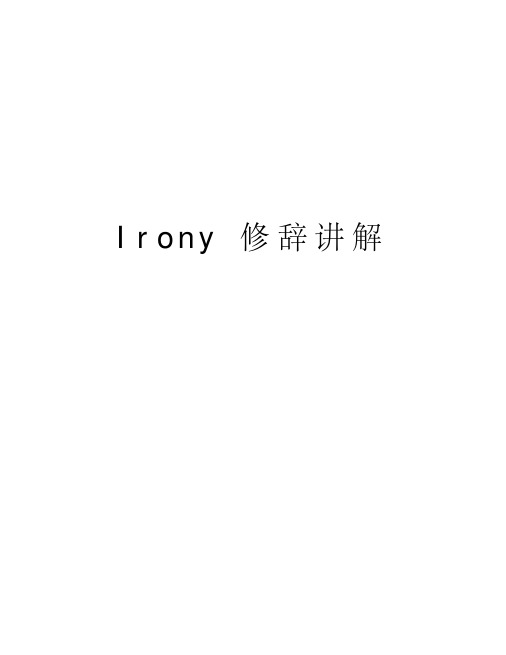
I r o n y修辞讲解IronyDefinition: 1.an important linguistic phenomenon in our daily life or literary works.2. saying sth but mean the opposite3. is a figure of speech, in order to bring emphasis to a particulartruth with deliberately use of language that is contrary to the truth.Origin: from Greek word “ eironeia”, means “dissimulation(修饰)”Types:1.verbal irony--refers to the speaker’s expression and intention comes apart: when a speaker says one thing but actually means annother, or when a literal meaning is contrary to its intended effect.“great game, Tom.” --when Tom fumbled three times.又如英国的 Gotham 是有名的愚人村 , 却故意说 :They are almost as wise as the wise men of Gotham .他们几乎和愚人村里的愚人一样聪明2.Situational irony--refers to one’s intention and the action’s result comes apart: the result of an action is contrary to the expected effect. Situational irony results from recognizing the oddness of a given situation, which can be positive or negative.Situational irony can be also called Circumstantial Irony or Irony of Fate.再例如凯特·肖邦 (Kate Chopin) 的短篇小说《一小时的故事》 ( The Story of an Hour) 中, 路易丝·马拉德(Louise Mallard) 太太得知丈夫因车祸去世的消息时表面上一阵号啕大哭, 内心里却暗自高兴, 她早就盼望这一天的到来, 不禁低声对自己说: “ Free ! Bodyand soul free !”但正当她暗自得意时,丈夫突然出现在门口 ! 原来他大难不死 , 安然回家 ,而 Mallard 太太却由于这突如其来的刺激而心脏病发作 , 不治身亡。
SAT阅读中英文修辞手法(10)
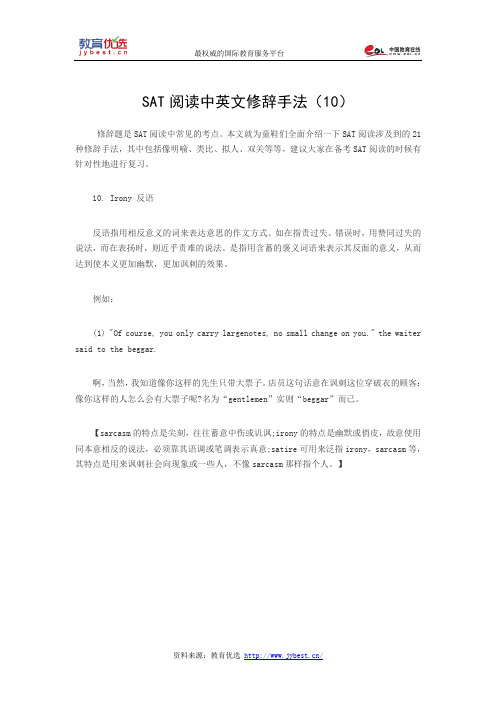
最权威的国际教育服务平台
资料来源:教育优选 /
SAT 阅读中英文修辞手法(10)
修辞题是SAT 阅读中常见的考点。
本文就为童鞋们全面介绍一下SAT 阅读涉及到的21种修辞手法,其中包括像明喻、类比、拟人、双关等等,建议大家在备考SAT 阅读的时候有针对性地进行复习。
10. Irony 反语
反语指用相反意义的词来表达意思的作文方式。
如在指责过失、错误时,用赞同过失的说法,而在表扬时,则近乎责难的说法。
是指用含蓄的褒义词语来表示其反面的意义,从而达到使本义更加幽默,更加讽刺的效果。
例如:
(1) "Of course, you only carry largenotes, no small change on you." the waiter said to the beggar.
啊,当然,我知道像你这样的先生只带大票子。
店员这句话意在讽刺这位穿破衣的顾客:像你这样的人怎么会有大票子呢?名为“gentlemen ”实则“beggar ”而已。
【sarcasm 的特点是尖刻,往往蓄意中伤或讥讽;irony 的特点是幽默或俏皮,故意使用同本意相反的说法,必须靠其语调或笔调表示真意;satire 可用来泛指irony ,sarcasm 等,其特点是用来讽刺社会向现象或一些人,不像sarcasm 那样指个人。
】。
运用irony的修辞手法的英语作文
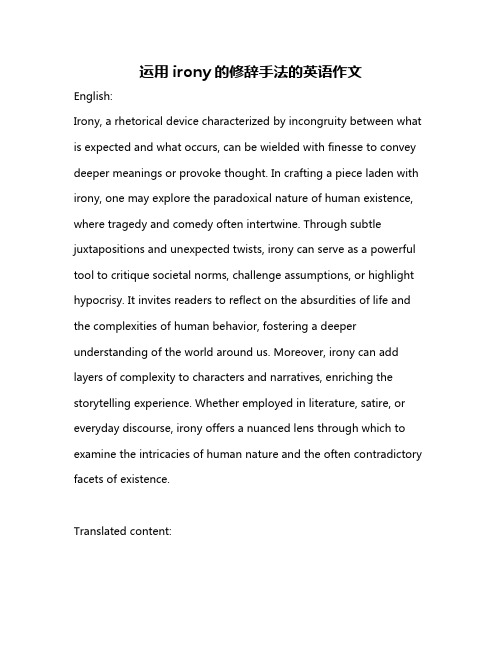
运用irony的修辞手法的英语作文English:Irony, a rhetorical device characterized by incongruity between what is expected and what occurs, can be wielded with finesse to convey deeper meanings or provoke thought. In crafting a piece laden with irony, one may explore the paradoxical nature of human existence, where tragedy and comedy often intertwine. Through subtle juxtapositions and unexpected twists, irony can serve as a powerful tool to critique societal norms, challenge assumptions, or highlight hypocrisy. It invites readers to reflect on the absurdities of life and the complexities of human behavior, fostering a deeper understanding of the world around us. Moreover, irony can add layers of complexity to characters and narratives, enriching the storytelling experience. Whether employed in literature, satire, or everyday discourse, irony offers a nuanced lens through which to examine the intricacies of human nature and the often contradictory facets of existence.Translated content:讽刺是一种修辞手法,其特点是预期与发生之间的不协调,可以精妙地运用以传达更深层的含义或引发思考。
irony名词解释

irony名词解释Irony (幽默)Irony is the use of words to convey a meaning that is the opposite of its literal meaning. It is often used to express humor, surprise, or sarcasm. Irony can be used both when speaking and when writing.Irony can be divided into three categories: verbal irony, situational irony, and dramatic irony. In verbal irony, a person or character - usually intentionally - says something that is different from what they really mean. For example, if a person says, 'What a wonderful day!' when they are standing in a thunderstorm, this is verbal irony.Situational irony is when the outcome of an event is different from what was expected. For example, if a fire department is called to extinguish a fire but arrives too late, this is situational irony.Dramatic irony occurs when a character in a story is unaware of something that the reader or audience knows. This creates a suspenseful feeling in the audience as they watch the character struggle unknowingly. For example, if the audience knows that a character is about to be attacked by a bear, but the character does not know, this is dramatic irony.Irony is a powerful tool that can be used to create humor or to make a point. It should be used carefully, however, as it can be easily misunderstood.。
翻译中常见的修辞格
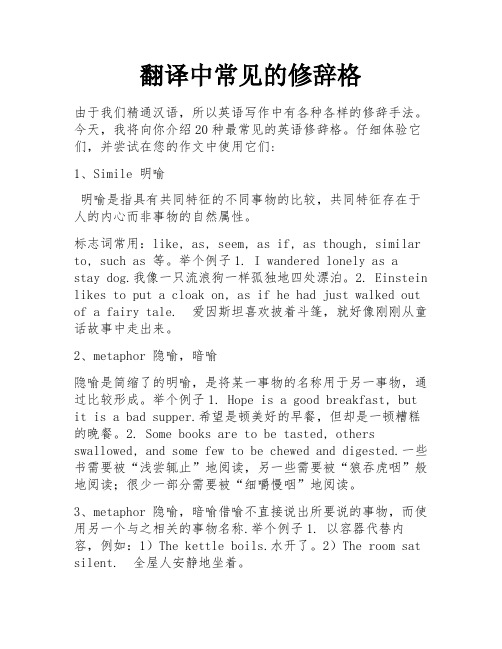
翻译中常见的修辞格由于我们精通汉语,所以英语写作中有各种各样的修辞手法。
今天,我将向你介绍20种最常见的英语修辞格。
仔细体验它们,并尝试在您的作文中使用它们:1、Simile 明喻明喻是指具有共同特征的不同事物的比较,共同特征存在于人的内心而非事物的自然属性。
标志词常用:like, as, seem, as if, as though, similar to, such as 等。
举个例子1. I wandered lonely as astay dog.我像一只流浪狗一样孤独地四处漂泊。
2. Einstein likes to put a cloak on, as if he had just walked out of a fairy tale. 爱因斯坦喜欢披着斗篷,就好像刚刚从童话故事中走出来。
2、metaphor 隐喻,暗喻隐喻是简缩了的明喻,是将某一事物的名称用于另一事物,通过比较形成。
举个例子1. Hope is a good breakfast, but it is a bad supper.希望是顿美好的早餐,但却是一顿糟糕的晚餐。
2. Some books are to be tasted, others swallowed, and some few to be chewed and digested.一些书需要被“浅尝辄止”地阅读,另一些需要被“狼吞虎咽”般地阅读;很少一部分需要被“细嚼慢咽”地阅读。
3、metaphor 隐喻,暗喻借喻不直接说出所要说的事物,而使用另一个与之相关的事物名称.举个例子1. 以容器代替内容,例如:1)The kettle boils.水开了。
2)The room sat silent. 全屋人安静地坐着。
2. 以资料、工具代替事物的名称,例如:Lend me your ears, please. 请听我说。
3. 以代替作品,例如:a plete Shakespeare 莎士比亚全集4. 以具体事物代替抽象概念,例如:I had the muscle, and they made money out of it. 我有力气,他们就用我的力气赚钱。
irony 讽刺 反语
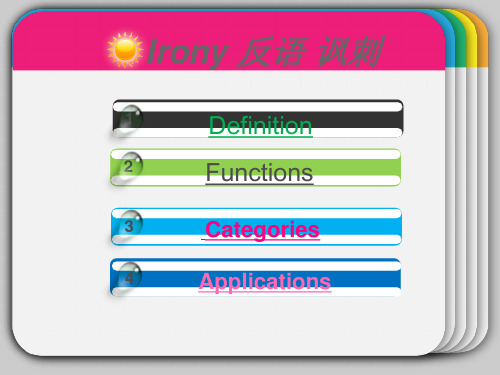
Categories
03
Ironies can be divided into two categories: verbal irony and situational irony. Verbal irony is the simple form of irony. It is used in everyday life.Verbal irony can be subdivided into light irony and heavy irony. 反语通常分为两类:词义反语和情景反语。 情景反语的意义主要从特定的情景中,从 作者对所叙述的事物的真实态度中体现出 来。词义反语从字面意义上就能判断出来, 是常用的表达方式。
For example, when someone hates the weather which spoils his trips and says," what a fine day!" he is ironical. the word "fine" is actually intended to mean "bad", "awful" and "abominable".
@WPS官方微博 @kingsoftwps
我们很幸运。到达彼岸的那一天是12月13 日,那是我们真的感到很愉快。
Situational irony 情景反语
Situational irony occurs when there is a discrepancy or incongruity betthe case and the real state of affairs.
①If people keep telling you to quit smoking cigarette, don't listen...They're probably trying to trick you into living.
irony修辞例句

irony修辞例句
当我们说irony时,通常是指人类文化中的一种修辞手法,用来传达出与字面意思相反的潜在含义。
以下是一些irony 修辞的例句:
1. 一位医生,因过量饮酒而死于肝硬化。
2. 在一条巨额赔款的新闻中,评论员评论道:“这家公司正在创造历史。
”
3. 当一位四处弹唱的街头音乐家,没有任何人停下来欣赏他时,他会说自己是“受欢迎的音乐家”。
4. 当一个进食大量包子的人,称自己是“健康饮食”的时候,我们可以说他是“在用反讽的方式描述自己”。
这些例句中,irony都起到了夸张和讽刺的作用,通过字面和隐含的意思之间的对比,强调了一些潜在的暗示或指责。
论英语irony的分类与作用

论英语irony的分类与作用英语irony是一种常见的修辞形式,对于语言研究者来说,研究irony可以帮助我们深入地了解英语语言特征,以及语言的潜在的美感和有趣的表现形式。
本文首先将英语irony的分类进行梳理,然后着重分析irony的作用。
英语irony通常可以分为三类:即体裁irony、情绪irony和意义irony。
体裁irony是指irony的表现形式,一般是指irony的文字表达,它可以通过使用反义词、比喻、拟人和疑问句等修辞手段来表达。
情绪irony主要指irony要表达的情感,它可以通过使用褒贬、引起矛盾或悬疑的语气来表达irony的情绪。
最后,意义irony主要是irony要表达的意义,它可以通过使用对照、暗示、讽刺等修辞手段来表达irony的意义。
英语中的irony有多种作用,首先,irony可以在文学作品中增加情节的趣味性,从而增加作品的魅力。
此外,irony还可以用来表达作家对事件或形势的看法。
例如,作家可以使用irony来表达自己对某一社会现象的反对,并通过讽刺等修辞形式抨击社会现象中不良的一面。
此外,irony还可以用来提升文学作品中人物的人格特征,从而使人物更加生动有趣。
最后,irony还可以用来获得读者的共鸣,从而使文本更e的跳脱单一的表达层次,让文字有更多的层次和思考空间。
由此可见,英语irony的作用十分重要,用于突出文字表达中的某些特殊意义,以及赋予文字有趣和活泼的空间,深受英语读者以及学习者的青睐。
综上所述,英语irony分为体裁、情绪和意义三类,主要作用是增加文字的趣味性,表达作家的看法,提升人物的人格特征,以及获得读者共鸣。
英语irony的广泛使用,犹如一剂强有力的良药,为英语读者的心理世界提供了一种新的视角和看法。
随着英语语言研究的不断深入,irony的作用被更加深入地挖掘和发掘,这将有助于我们更好地理解英语,更好地领略其中的美感。
修辞-Irony

这是证明他那可爱的国家的仁慈法律 的一个多么漂亮的例证!— 他们允许 穷人睡觉!
(This passage implies that Colonel Cathcart was not democratic at all: his democratic spirit extended only to his own group; all others he treated with scorn and highhandedness)
Heavy Irony:
A famous example of heavy irony is Mark Antony’s speech at the burial ceremony of Caesar in Shakespeare’s Julius Caesar:
“Friends, Romans, Countrymen, lend me your ears; I come to bury Caesar, not to praise him. The evil that men do lives after them, The good is oft interred with their bones; So let it be with Caesar. The noble Brutus Hath told you Caesar was ambitious. If it were so, it was a grievous fault; And grievously hath Caesar answer’d it. Here, under leave of Brutus and the rest— For Brutus is an honorable man;
irony修辞定义

irony修辞定义
Irony是一种修辞手段,指用相反的意义来表达实际的思想,以增强幽默感、讽刺性或讲话的力量。
具体可分为词义反用法和情景式反语两种形式:
- 词义反用法(antiphrase):用字词表达相反的意思,如“hard-working”表示“懒惰的”。
- 情景式反语(situational irony):主要借助于溢于文中的反语笔触来传达这种意味。
通过运用反讽的手法,作者可以以戏谑、嘲笑或讽刺的方式来表达对现实或观点的批评和思考。
这种修辞手法在口语和书面语中都经常使用,以突出表达者对事物或观点的质疑和不满。
英语常用修辞格
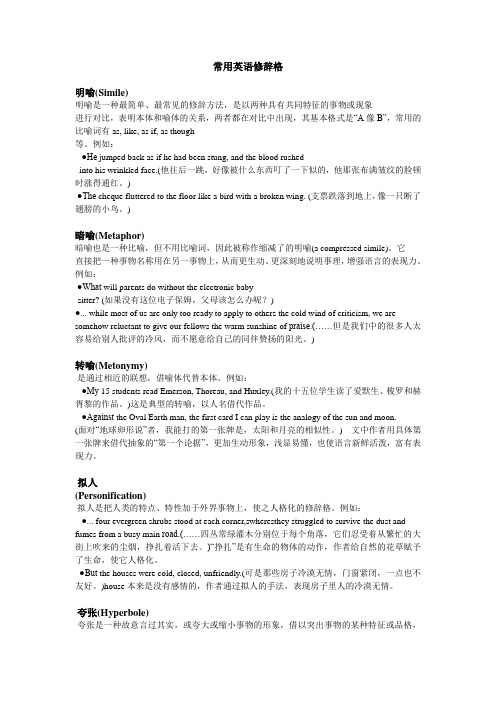
常用英语修辞格明喻(Simile)明喻是一种最简单、最常见的修辞方法,是以两种具有共同特征的事物或现象进行对比,表明本体和喻体的关系,两者都在对比中出现,其基本格式是“A像B”,常用的比喻词有as, like, as if, as though等。
例如:●He jumped back as if he had been stung, and the blood rushedinto his wrinkled face.(他往后一跳,好像被什么东西叮了一下似的,他那张布满皱纹的脸顿时涨得通红。
)●The cheque fluttered to the floor like a bird with a broken wing. (支票跌落到地上,像一只断了翅膀的小鸟。
)暗喻(Metaphor)暗喻也是一种比喻,但不用比喻词,因此被称作缩减了的明喻(a compressed simile)。
它直接把一种事物名称用在另一事物上,从而更生动、更深刻地说明事理,增强语言的表现力。
例如:●What will parents do without the electronic baby-sitter? (如果没有这位电子保姆,父母该怎么办呢?)●... while most of us are only too ready to apply to others the cold wind of criticism, we are somehow reluctant to give our fellows the warm sunshine of praise.(……但是我们中的很多人太容易给别人批评的冷风,而不愿意给自己的同伴赞扬的阳光。
)转喻(Metonymy)是通过相近的联想,借喻体代替本体。
例如:●My 15 students read Emerson, Thoreau, and Huxley.(我的十五位学生读了爱默生、梭罗和赫胥黎的作品。
Satire与Irony差异浅析

irony 名词解释

irony 名词解释
“irony”的名词解释如下:
“irony”一词源于希腊语“eiron”,原意为“佯装无知者”,后来演变为“说反话”的意思。
在文学、艺术和日常生活中,irony 通常指一种用反语或讽刺的方式表达与表面意思相反的真实意图或观点的修辞手法。
irony 可以分为不同的类型,如口头 irony、戏剧性 irony 和情景 irony 等。
口头irony 是指说话人用与实际意思相反的话语来表达自己的真实意图,常常带有幽默或讽刺的效果。
例如,当一个人说“我真是太聪明了”时,他实际上可能是在自嘲或表达对自己的不满。
戏剧性 irony 则是指作者或说话人通过故事情节或对话来展示与读者或听众所期望的结果相反的情况,以此来产生一种意外或幽默的效果。
情景 irony 则是指一种在特定情境下产生的与预期结果相反的情况,通常不涉及任何人为的意图。
irony 不仅是一种修辞手法,也是一种思维方式和文化现象。
它可以帮助人们更好地理解和欣赏文学、艺术和日常生活中的复杂性和多样性,同时也可以帮助人们更好地表达自己的观点和情感。
Irony修辞讲解
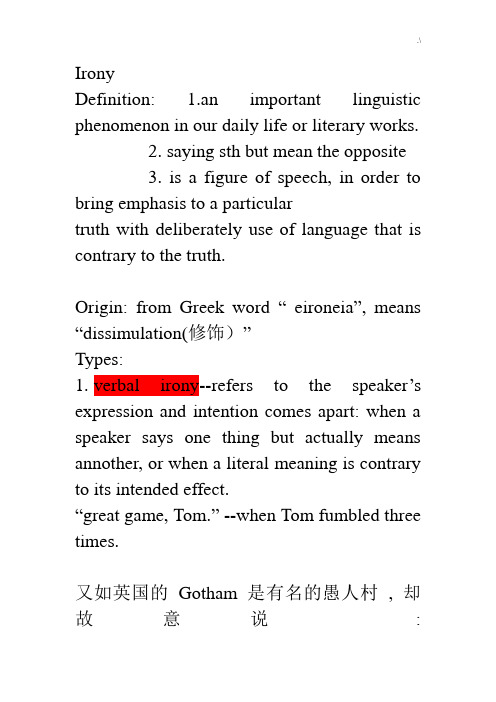
IronyDefinition: 1.an important linguistic phenomenon in our daily life or literary works.2. saying sth but mean the opposite3. is a figure of speech, in order to bring emphasis to a particulartruth with deliberately use of language that is contrary to the truth.Origin: from Greek word “eironeia”, means “dissimulation(修饰)”Types:1.verbal irony--refers to the speaker’s expression and intention comes apart: when a speaker says one thing but actually means annother, or when a literal meaning is contrary to its intended effect.“great game, Tom.” --when Tom fumbled three times.又如英国的Gotham 是有名的愚人村, 却故意说:They are almost as wise as the wise men of Gotham . 他们几乎和愚人村里的愚人一样聪明2.Situational irony--refers to one’s intention and the action’s result comes apart: the result of an action is contrary to the expected effect. Situational irony results from recognizing the oddness of a given situation, which can be positive or negative.Situational irony can be also called Circumstantial Irony or Irony of Fate.再例如凯特·肖邦(Kate Chopin) 的短篇小说《一小时的故事》( The Story of an Hour) 中, 路易丝·马拉德(Louise Mallard) 太太得知丈夫因车祸去世的消息时表面上一阵号啕大哭, 内心里却暗自高兴, 她早就盼望这一天的到来, 不禁低声对自己说: “Free ! Body and soul free !”但正当她暗自得意时, 丈夫突然出现在门口! 原来他大难不死, 安然回家, 而Mallard 太太却由于这突如其来的刺激而心脏病发作, 不治身亡。
英语修辞格1

1.明喻(Simile)明喻是一种最简单、最常见的修辞方法,是以两种具有共同特征的事物或现象进行对比,表明本体和喻体的关系,两者都在对比中出现,其基本格式是“A像B”,常用的比喻词有as,like,as if,as though等。
例如:●He jumped back as if he had been stung,and the blood rushedsintoshis wrinkled face.(他往后一跳,好像被什么东西叮了一下似的,他那张布满皱纹的脸顿时涨得通红。
)在《品尝家》一文中老人对“我”的慷慨施舍的反应如同被蜜蜂叮过一样,生动地刻画出一个处境凄凉内心却极度敏感的可怜老人的形象。
●The cheque fluttered to the floor like a bird with a broken wing. (支票跌落到地上,像一只断了翅膀的小鸟。
)《礼物》一文中,老太太喜迎八十大寿,大女儿不来庆祝,只寄来一张支票。
作者把这张支票比作断了翅膀的小鸟,形象地表达出此刻老太太希望破灭,极度伤心的心情。
2.暗喻(Metaphor)暗喻也是一种比喻,但不用比喻词,因此被称作缩减了的明喻(a compressed simile)。
它直接把一种事物名称用在另一事物上,从而更生动、更深刻地说明事理,增强语言的表现力。
例如:●What will parents do without the electronic baby-sitter?(如果没有这位电子保姆,父母该怎么办呢?)形象地说明了电视机的保姆功用。
●……while most of us are only too ready to apply to others the cold wind of criticism,we are somehow reluctant to give our fellows the warm sunshine of praise.(……但是我们中的很多人太容易给别人批评的冷风,而不愿意给自己的同伴赞扬的阳光。
修辞学 提喻 借喻 Session 9
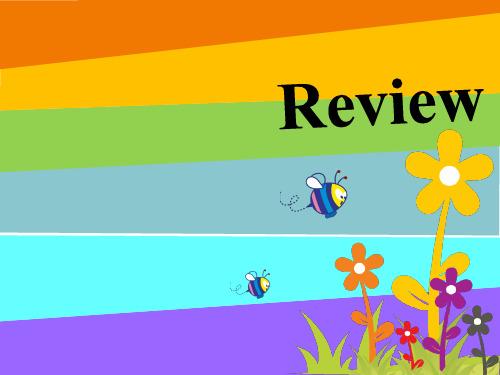
1.4 以属代替种
(以上义词代替下义词)
One day a poor creature who could not have been more than four feet tall crept past me under a vast load of wood.
一天,一个身高不到四英尺的可 怜妇人背着老大一捆柴火从我 身边蹒跚而过。 Analysis:
laurels 月桂树
Rather than resting on our laurels, we have feared getting fat and lazy. Apollo and Daphne: 爱神丘比特为了
向阿波罗复仇,将一支使人陷入爱 情漩涡的金箭射向了他,使阿波罗 而不是在我们的荣誉上休息,我 疯狂地爱上了达芙妮;同时,又将 一支使人拒绝爱情的铅箭射向达芙 们害怕变得肥胖和懒惰。 妮,使姑娘对阿波罗冷若冰霜。当 达芙妮回身看到阿波罗在追她时, 急忙向父亲呼救。河神听到了女儿 的声音,在阿波罗即将追上她时, 将她变成了一棵月桂树。达佛妮虽 然成了树,阿波罗仍然很喜欢她, 他拥抱着树干,树叶沙沙地颤抖着。 “你将成为我的树,”他说,“你 将终年长青,成为胜利者的荣冠。”
借代
不直接说出某人或某事物的名称,而是借用与其密切 相关的名称或其本身的某种属性来称代(吕煦 2004:165)(“换一个说法”)
1.synecdoche [sɪ'nekdəkɪ]提喻 2.metonymy [mɪ'tɒnɪmɪ]借喻
巾帼不让须眉。
朱门酒肉臭,路有冻死骨。--杜甫 《自京赴奉先县咏怀 五百字》
Poet Laureate 桂冠诗人
Soapy stood still with his hands in his pockets and smiled at the sight of brass buttons. ---The Cop and the Anthem
Irony

Irony and Sarcasm
Sarcasm:a way of using words that
are the opposite of what you mean in order to be unpleasant to sb or to make fun of them.嘲讽,讽刺,挖 苦
Examples: 1、Congratulations on your brilliant academic results! 2、"It was a good idea to tell my mother you didn't like her dress", she said with sarcasm.
Bill:Well!What a worthwhile use of an evening. Alice:Yeah.
Sarcasm:
(Note:Aliceห้องสมุดไป่ตู้hates Bill's travel books.)
Alice:They are your travel books,Bill?You are a really
skillful author! Bill:Oh.
Exercise
1、(note:Ellen's sister took the biggest piece of cake.) Ellen:How unselfish you are! sarcasm 2、(note:It's cold and rainy.) It's a perfect day to go for a picnic. irony 3、The public is wonderfully tolerant-it forgives everything except genius. irony ---Oscar Wilde
- 1、下载文档前请自行甄别文档内容的完整性,平台不提供额外的编辑、内容补充、找答案等附加服务。
- 2、"仅部分预览"的文档,不可在线预览部分如存在完整性等问题,可反馈申请退款(可完整预览的文档不适用该条件!)。
- 3、如文档侵犯您的权益,请联系客服反馈,我们会尽快为您处理(人工客服工作时间:9:00-18:30)。
Irony (反语):所谓反语,就是说反话。
即说话人或作者要表达的意思却是字面上的反面意思。
这种辞格有时带有讽刺的意味,有时只表示一种善意的幽默。
有人认为Irony就是讽刺,这是一种误解,因为进行讽刺不一定说反话,而说反话只是讽刺的手法之一。
A contradiction of expectation between what is said and what is meant or anincongruity (不谐调) between what might be expected and what actually occurs;often connected to a fatalistic or pessimistic view of life.The main three types are dramatic, verbal, situational.1. Dramatic Irony:A situation in which the audience knows something about present or futurecircumstances that the character does not know.e.g. --Romeo and Juliet by William Shakespeare:When Romeo finds Juliet in a drugged sleep, he assumes her to be dead and kills himself. Upon awakening to find her dead lover beside her, Juliet then kills herself.--When watching a talk show, the audience knows why a person has been brought on the show. However, the person sitting in a chair does not know that he is going to be reunited with a former lover. This adds to the suspense and humor of the show.2. Verbal Irony(词义反语):A contradiction of expectation between what is said and what is meant .e.g. --You are arguing with your mother, who reprimands (申斥,训斥)you for being "smart." Your reply is a sarcastic, "If you think I am smart, then why won't you let me make some smart decisions?"--Your boyfriend shows up in ripped-up (划破的) jeans and a stained t-shirt. With a smirk, you say, "Oh! I see you dressed up for our date. We must be going to a posh (高档的)restaurant."3. Situational Irony (情景式反语):A contradiction of expectation between what might be expected and what actually occurs often connected to a fatalistic or pessimistic view of life.e.g. --You stay up all night studying for a test. When you go to class, you discover the test is not until the next day.--Macbeth by William Shakespeare:The witches (女巫) predict one thing, which happens to come true but Macbeth often misinterprets their words.The Rime of the Ancient Mariner by Coleridge:Water, water, everywhere,And all the boards did shrink;Water, water, everywhere,Nor any drop to drink.(In this example it is ironic that water is everywhere but none of it can be drunk.) Sarcasm (讽刺,挖苦):指用尖酸刻薄的讽刺话,既可用反语、比喻,也可用直叙法对个人的缺点、过失或社会上的丑恶现象及黑暗而进行讽刺、挖苦,常是有意伤害他人的感情,所以它常含有相当强的贬义。
e.g. Laws are like cobwebs, which catch small flies, but let wasps and hornets breakthrough. 法律像蜘蛛网一样,能捉住小苍蝇,却让胡风、黄蜂钻过去了。
(Swift用比喻来讽刺当时的法律不公正。
)Seeing a bad accident occur and remarking with no feeling in one's voice, "Oh, how lovely." would be considered a standard form of sarcasm.“There is doubt about that,” Darrow snor ted.(=Darrow said scornfully that it was doubtful whether man had reasoning power.) 达罗轻蔑地说:“对于这一点还有人怀疑呢。
”(Darrow用直叙法来讽刺、挖苦原教旨主义者没有思维能力。
)Sarcasm一般是用句子或话语表示讽刺意义,而且不一定要说反话;Irony一般是用单词或短语表示讽刺或幽默,而且一定是说反话。
Ridicule(嘲笑,嘲弄):用开玩笑或贬低的方法来引起人们对某人某事的轻视、嘲笑、厌恶等感情。
它常用来揭示某人、某事可笑的外表或狼狈的处境或者愚蠢的行为,产生一种轻视、贬低、嘲弄、丑化事物的修辞效果。
e.g. Bryan mopped his bald dome in silence.(= Bryan wiped the sweat off his bald head in silence.)布赖恩擦了擦秃头上的汗珠,没有作声。
(作者嘲笑布赖恩失败时的狼狈处境。
)The house detective’s piggy eyes surveyed her sardonically from his gross jowled face.这个脸上堆满肥肉的探长用他那对臃肿的小眼睛讥讽地打量了她一下。
(作者嘲笑奥格尔维的贪婪外表。
)Ridicule以某人某事可笑的外表、举止或狼狈处境为笑柄进行嘲笑,以达到轻视、贬低、丑化某人或事物的目的。
Satire (讽刺):指用散文、诗歌、戏剧、小说、电影等文学作品形式,综合运用反语法或挖苦、谩骂、嘲笑、讽刺等手法,对个人或社会的愚昧、过失或丑恶加以揭露、抨击和批判。
e.g. Quite right, the laws are turnpikes (高速公路), only made to stop people who walkon foot, and not to interrupt those who drive through them in their coaches.对极了,法律是高速公路,只能挡住那些用腿走路的人,但却挡不住那些在路上开车的人。
(Fielding 在这里用比喻讽刺当时的法律不公正。
)Fools had ne’er less grave in a year, (这年头傻瓜供过于求,)For wise men are grown foppish, (聪明人个个变了糊涂,)And know not how their wits to wear, (顶着个没有思想的头,)Their manners are so apish. (只会跟着人依样画葫芦。
)(Shakespeare: King Lear)(作者在这里嘲讽了那种没有思想,只能像猿猴一样跟在别人后面亦步亦趋的傻瓜。
)Sarcasm, Ridicule, Satire:Sarcasm 是以话语对个人或社会的弊病、过失和黑暗而进行讽刺、挖苦;Ridicule 是以短语等形式对某人某事的可笑外表和狼狈处境加以嘲笑,以贬低某人或事物;Satire是以文学作品形式,采取挖苦、嘲笑、讲反语等手段,揭露、讽刺、批判个人或社会的愚昧、过失或罪恶。
Figures of speech⏹simile⏹metaphor⏹metonymy⏹synecdoche⏹onomatopoeia⏹oxymoron⏹personification⏹hyperbole⏹euphemism⏹alliteration⏹pun⏹antithesis⏹transferred epithet⏹repetition⏹parallelism⏹anticlimax⏹allusion。
